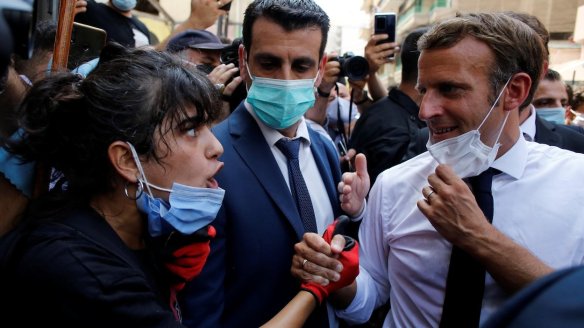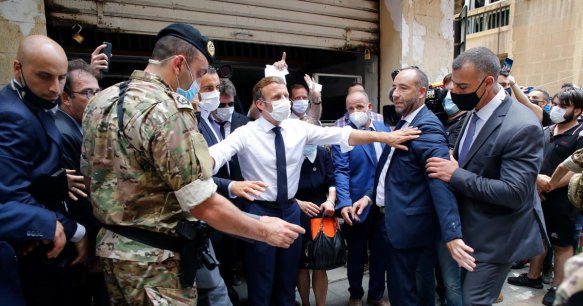Flying in on his glistening white jet with the words République Française emblazoned on its sides, President Macron arrived in shell-shocked Beirut yesterday like Jesus the Saviour riding on a white horse.
Then I saw the heavens opened, and behold a white horse! And He who sat on him was called Faithful and True. He administers justice and wages war righteously. His eyes are like a flame of fire, and on his head are many royal crowns.
Revelation 19:11-16, The Bible, New King James version
Here in France, we watched our TV screens with stupefaction as the President of France walked through the crowded streets like the Messiah, surrounded by weeping, clapping, lamenting and visibly distressed citizens.
“Please help us!”
“Don’t give money to our politicians, they’ll keep it for themselves!”
“They’re all criminals!”
“Macron for President of Lebanon!”
“Revolution!”
“The Lebanese people are suffering an emotional, moral and financial crisis,” Macron proclaimed, “And we are going to help them.”
#EmmanuelMacron showing 10x more leadership than ALL Lebanese politicians combined.
Nothing could underscore more the ineptitude of the government as 2,750 tons of highly explosive ammonium nitrate was left to languish in a ramshackle portside warehouse for years despite repeated warnings.
The oddity of yesterday’s situation was the glaring absence of Lebanon’s leaders. Where were they? Too scared to show their faces for fear of being physically attacked by their own people or even killed, the cowards beat a hasty retreat to hide in their luxurious, air-conditioned homes and offices. How odd to see a foreign leader mingling with and comforting these beleaguered people when, in a real world and not this dysfunctional one, it should be the Lebanese leaders themselves.
For decades, the tiny country of Lebanon has been ruled by a mafia-like gang of thugs and thieves. The administration of the country has been compared to a feudal system, the lords being family clans, former war lords and militia leaders who provide housing, jobs and services to vassals in exchange for protection, subservience and allegiance.
They are, in truth, criminals who should be tried in a court of law and thrown in prison. For too long the country has been mired in government corruption, patronage and favouritism. Untold millions have been stolen from the public coffers by these thieving factions/gangsters/criminal families.
Home to 18 different religious confessions, ethnic groups and tribes, the President must be a Maronite Christian, whereas the Parliament Speaker and Prime Minister must be a Shi’a and Sunni Muslim respectively. In addition, 64 of the 128 seats in parliament are reserved for Muslims, while the other half is for Christians.
The Shiite coalition is composed of Hezbollah and the Amal Movement. Both are Iran-backed and trace their roots to the civil war era.
Wearing a black tie in mourning, Macron promised angry Lebanese crowds that French aid would not go into “corrupt hands”. “I want a new political pact and I’ll come back in September,” he said, adding “Without deep structural reforms, there will be no financial aid.”
But back in France, the French were not overly-impressed with Macron’s humanitarian mission. In the office this morning, the topic was discussed around my espresso machine. My French colleagues grumbled. (The French are always grumbling.)
“We have enough problems here in France; Macron should look after his own people.”
“It’s up to the Lebanese people to force change, not an outsider. Otherwise, that’s just called meddling.”
“Quelle arrogance ! Have you noticed how arrogant all of our presidents are here in France? What right does he have to go to a foreign country and lay down the law? Lebanon is no longer a French protectorate. I mean, seriously, with what legitimacy is he able to do that?”
(In 1923 and after the Partition of the Ottoman Empire, the League of Nations mandated that Lebanon would be administered by France. Lebanon officially became part of the French colonial empire. The French mandate lasted until 1943, when two independent countries emerged, Syria and Lebanon. French troops eventually left Syria and Lebanon in 1946.)
In Beirut a petition was signed with 60,000 signatures: that Lebanon returns to French mandate for ten years.
Whatever Macron’s strategy, it took a lot of courage for him to do what he did, and I applaud his efforts.


As I later wrote in the Comments section, here’s the primary reason of his visit:
One thing is sure: the country can no longer continue down this path. Most importantly, if it wants to receive financial aid from outside, it needs to clean up its act. That was the main reason of Macron’s visit. Serving as spokesperson for international organizations such as the IMF, the World Bank and the EU who are behind him (and poised to send billions to Lebanon following this recent crisis), the president went to Beirut to reflect the exasperation of the international community. No more subsidies until you provide us with complete transparency! There are conditions attached to receiving aid, and it will be outsiders now, not the crooks from within, who will monitor and distribute the funds. Don’t forget that before becoming Prez, Macron was a banker.



Perhaps, just perhaps, Macron is seizing on the bigger picture. Much of the turmoil in the Middle East and the continuing involvement in Iraq and Afghanistan, can be traced back to the Sykes-Picot Agreement of 1916. Of all the political mis-steps and postcolonial failures, the Beirut tragedy may offer Macron an opportunity to make right in a non-military manner, an offer to the people of Lebanon the spark for democratic self-determination.
As you can imagine, CB, much has been written and commented on in the European media à propos Macron’s visit. Firstly, it’s agreed by everyone that he took an enormous risk, both politically and physically (he could easily have been assassinated; after all, this is the Middle East.) Others accuse him of “weaving a geopolitical network to push back the hegemonic tendencies of Turkey in the Mediterranean”.
Germany’s Der Spiegel paid tribute to the performance of the president. “By going so quickly to Lebanon to show his support for the population”, Emmanuel Macron endorses the “leadership” of the continent, and sends a “strong signal from Europe”.
Yes, let’s hope that his presence will motivate the Lebanese people to see a different and better way of governance.
One thing is sure: the country can no longer continue down this path. Most importantly, if it wants to receive financial aid from outside, it needs to clean up its act. That was the main reason of Macron’s visit. Serving as spokesperson for international organizations such as the IMF, the World Bank and the EU who are behind him (and poised to send billions to Lebanon following this recent crisis), the president went to Beirut to reflect the exasperation of the international community. No more subsidies until you provide us with complete transparency! There are conditions attached to receiving aid, and it will be outsiders now, not the crooks from within, who will monitor and distribute the funds. Don’t forget that before becoming Prez, Macron was a banker.
Thanks for the analysis direct from Paris. We always enjoy reading you. Our hearts go out to the survivors of the Beirut blast. It’s clear that fundamental change needs to be enacted now.
Easier said than done, unfortunately. Thanks for commenting!